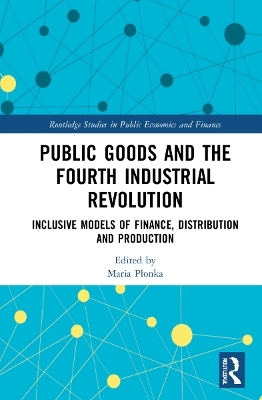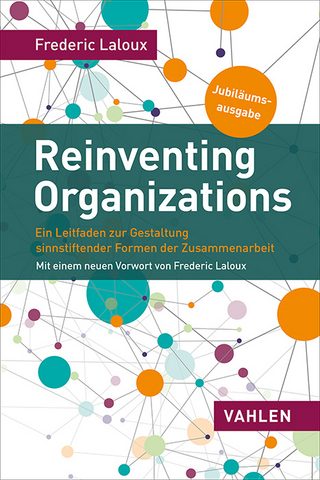
Public Goods and the Fourth Industrial Revolution
Inclusive Models of Finance, Distribution and Production
Seiten
2024
Routledge (Verlag)
978-1-032-22900-3 (ISBN)
Routledge (Verlag)
978-1-032-22900-3 (ISBN)
This book redefines the current paradigm of public goods in the era of the fourth industrial revolution. It proposes a model of production and distribution of public goods that acknowledges the participation of entities from the public, private, and nonprofit sectors.
The fourth industrial revolution, characterized by digitization, artificial intelligence and augmented reality, and megatrends such as globalization, urbanization, demographic changes, and the knowledge-based economy, will trigger a series of profound technological, economic, social and environmental changes that will permanently and irreversibly change the role of the state in meeting social needs. Industry 4.0 will also change the type, nature, and scope of public goods and how they are produced, financed, delivered, and consumed. This book redefines the current paradigm of public goods. It proposes a model of production and distribution of public goods that acknowledges the participation of entities from the public, private, and nonprofit sectors. The authors argue that these entities would participate in the production, financing, distribution, and consumption of such goods. From a theoretical point of view, such an inclusive approach involving the expansion of the classical state – market dichotomy with new entities, including citizens themselves, leads to a new conceptualization and approach towards public goods. The model assumes shared responsibility, subsidiarity, and paternalistic libertarianism, and it allows the state to create new entities of an educational or fiscal nature, while remaining the regulator of public services and distribution. Additionally, the book analyzes changes regarding the perception of public goods, in the era of the fourth industrial revolution, across selected sectors such as healthcare and pension systems, education, local public goods, and public utility services. The book is primarily addressed to researchers, scholars, and students across social and technical sciences, and it will also be a useful guide for central and local administration bodies responsible for public policy. Chapters 4, 5 and 6 of this book are available for free in PDF format as Open Access from the individual product page at www.routledge.com. They have been made available under a Creative Commons Attribution-Non Commercial-No Derivatives 4.0 license.
The fourth industrial revolution, characterized by digitization, artificial intelligence and augmented reality, and megatrends such as globalization, urbanization, demographic changes, and the knowledge-based economy, will trigger a series of profound technological, economic, social and environmental changes that will permanently and irreversibly change the role of the state in meeting social needs. Industry 4.0 will also change the type, nature, and scope of public goods and how they are produced, financed, delivered, and consumed. This book redefines the current paradigm of public goods. It proposes a model of production and distribution of public goods that acknowledges the participation of entities from the public, private, and nonprofit sectors. The authors argue that these entities would participate in the production, financing, distribution, and consumption of such goods. From a theoretical point of view, such an inclusive approach involving the expansion of the classical state – market dichotomy with new entities, including citizens themselves, leads to a new conceptualization and approach towards public goods. The model assumes shared responsibility, subsidiarity, and paternalistic libertarianism, and it allows the state to create new entities of an educational or fiscal nature, while remaining the regulator of public services and distribution. Additionally, the book analyzes changes regarding the perception of public goods, in the era of the fourth industrial revolution, across selected sectors such as healthcare and pension systems, education, local public goods, and public utility services. The book is primarily addressed to researchers, scholars, and students across social and technical sciences, and it will also be a useful guide for central and local administration bodies responsible for public policy. Chapters 4, 5 and 6 of this book are available for free in PDF format as Open Access from the individual product page at www.routledge.com. They have been made available under a Creative Commons Attribution-Non Commercial-No Derivatives 4.0 license.
Maria Płonka is Professor in the Department of Risk Management and Insurance, Cracow University of Economics, Poland.
Introduction 1. The fourth industrial revolution and contemporary technological, economic, and cultural megatrends 2. Public goods in economic and other social sciences 3. The impact of megatrends and the evolution of public goods 4. Health security as a public good in the era ofthe fourth industrial revolutionin Poland 5. Local public goods and public utility services in municipalities (urbanized areas)6. Challenges for the education system inthe era ofthe fourth industrial revolution7. Conclusion
| Erscheinungsdatum | 15.08.2022 |
|---|---|
| Reihe/Serie | Routledge Studies in Public Economics and Finance |
| Zusatzinfo | 40 Tables, black and white; 35 Line drawings, black and white; 35 Illustrations, black and white |
| Verlagsort | London |
| Sprache | englisch |
| Maße | 156 x 234 mm |
| Gewicht | 453 g |
| Themenwelt | Wirtschaft ► Betriebswirtschaft / Management ► Planung / Organisation |
| Wirtschaft ► Volkswirtschaftslehre ► Wirtschaftspolitik | |
| ISBN-10 | 1-032-22900-4 / 1032229004 |
| ISBN-13 | 978-1-032-22900-3 / 9781032229003 |
| Zustand | Neuware |
| Haben Sie eine Frage zum Produkt? |
Mehr entdecken
aus dem Bereich
aus dem Bereich
ein Leitfaden zur Gestaltung sinnstiftender Formen der Zusammenarbeit
Buch | Softcover (2024)
Vahlen (Verlag)
29,80 €
organisationaler Diskurs als Schlüssel zum Change
Buch | Softcover (2024)
Vahlen (Verlag)
24,90 €
Basiswissen – Unternehmensbewertung – Ablauf von M&A
Buch | Softcover (2024)
Erich Schmidt Verlag
39,95 €


